- Home
- K. M. Ashman
Templar Steel Page 5
Templar Steel Read online
Page 5
‘You boy, hold there!’
Tobias turned around to see two of the guards striding across the courtyard to where Hassan was cowering under a cart. One of the soldiers lowered his lance and pointed it at the boy.
‘Stay right where you are,’ he growled, ‘or I swear I will stick you like a pig.’
‘I saw him earlier trying to sneak in,’ said the second guard. ‘He must be spying on behalf of the Saracens. Throw him in the jail and the Marshal will have him hung at first light.’
‘No,’ gasped Hassan, ‘it is not true. I am a Christian and only seek to serve.’ He scuttled from beneath the cart to run toward the gate but had not reached halfway before one of the other soldiers fell upon him, dragging him to the floor.
‘Hold him tight,’ shouted the guard running over, ‘he’ll not escape us this time.’
‘Master Tobias,’ shouted Hassan, ‘please tell them I am no spy.’
Despite the plea, Tobias watched in silence. His heart felt sorry for the boy, but Hassan had been warned many times so only had himself to blame. He turned away to continue his own tasks, confident that it was none of his business and if Hassan really was as innocent as he claimed to be, then the Marshal would show leniency and let him go free.
----
The following morning, Tobias waited with his horse and mule, both loaded with stores for the forthcoming journey. All around him, the courtyard was busy with horses and carts as the column prepared to leave for Gaza.
Eventually, the church door opened and Eudes de St Amand led the brotherhood out into the early morning air. As they dispersed to their mounts, Cronin walked through the throng to address the squires.
‘Is everything as it should be?’ he asked.
‘Aye, my lord,’ came the reply from two of the boys but Tobias remained silent.
‘You did not reply, Tobias’ said Cronin, ‘are you not ready?’
‘My tasks are fulfilled,’ said Tobias, ‘but my conscience lays as heavy upon me as a pack upon a mule.’
‘What is it you have done?’ asked Cronin.
‘It is not what I have done,’ said Tobias looking up at the Sergeant, ‘but that which I did not do.’
‘You make no sense, Tobias, share what concerns you, so I can be the judge.’
‘My Lord,’ said Tobias, ‘I may not be of noble stock yet every day I live my life amongst those who serve the cross and I see clearly the way that we should all live our lives. I often think that one day I may aspire to wear the red cross, even as a Sergeant, yet the first time I had a chance to do something noble, I shied away like a coward.’
‘Tell me,’ said Cronin.
‘My lord, yesterday, Hassan came to find out where we were going and to beg passage in our service.’
‘He came into the courtyard?’
‘Aye, he did, and was arrested as a spy by two of the castle guards. He declared his innocence and called upon me as a witness, yet I maintained my silence lest I too was punished. Now I fear he is to be hung for a crime he did not commit.’
Cronin. stared at the squire, his mind working furiously.
‘Where is he now?’
‘I heard them say he was being thrown into the jail and would appear before the Marshal this very morn.’
‘And do you know where this place is?’
‘Aye, my lord, I took a message there on behalf of the Grand Master not two days since.’
‘Then come, lead the way.’
‘Cronin,’ said another sergeant who had overheard the conversation. ‘We are close to leaving. You should seek permission.’
‘There is no time,’ said Cronin. ‘I will be within the sound of the bells as is our sworn oath and will return as quickly as I can. If you leave before I return, I will catch you up on the trail.’
‘On your own head be it,’ said the other sergeant and watched as Cronin followed Tobias out of the courtyard gates.
----
‘It is only three streets away,’ gasped Tobias as he ran, ‘we are almost there.’
Moments later they reached a small square full of people gathered to witness the daily executions. In the centre stood a wooden scaffold with a noose hanging from a gibbet and on the floor to one side lay three bodies already wrapped in shrouds.
Frantically Tobias looked around, hoping against hope that Hassan was not amongst them and gasped in relief when he saw the boy in a queue of four men, each waiting to be executed.
‘My lord Sergeant,’ he gasped, ‘look.’
Cronin spied Hassan and his heart sunk as it became clear the boy had received a severe beating. Tobias started to head in his direction, but Cronin stayed still, looking around the rest of the crowd.
‘My lord,’ said Tobias, coming back to the sergeant, ‘what are you waiting for? We have to seek the Marshal and declare Hassan’s innocence.’
‘There is no time,’ said Cronin. ‘He has already delivered his verdict and could be anywhere. By the time we find him, it will be too late.’
‘Then what are we to do?’
‘Look around you, Tobias,’ said Cronin, ‘do you see the men who arrested him?’
Tobias scanned the crowd.
‘No, my lord.’
‘They have to be here,’ said Cronin, ‘the law says the accuser must witness the execution. Look again.’
Tobias climbed up on a box and searched the rest of the square.
There,’ he said suddenly, pointing to the far wall, ‘he drinks ale with his comrade.’
‘I see him,’ said Cronin. ‘Come with me.’ The sergeant forced his way through the throng as the cheering crowd and the sound of the trap door slamming open behind him told him another man had been hung.
‘You there,’ he said approaching the guards, ‘I hear you are the accuser of the Bedouin boy.’
‘I am,’ said one of the men standing up, ‘what’s it to you?’
‘He is innocent of all charges,’ said Cronin, ‘and is as Christian as you or I.’
‘Are you blind?’ laughed the second man standing up alongside his comrade. ‘He is as brown as your sword belt and wears heathen garb. He is surely a Saracen spy and we will receive a bounty for his capture.’
‘The boy’s skin colour does not reflect his guilt nor his faith,’ said Cronin. ‘There are thousands of good Christians in Jerusalem, some blacker than the darkest night, as well you know.’
‘Yes, but none of them were hiding in the Templar courtyard, were they? You should be thanking us, not serving admonishment for we probably saved Templar blood with our watchfulness.’
‘You say he wore a thawb,’ said Cronin.
‘Aye, so what if he did?’
‘Then ask yourself this. If he was truly a spy, why would he wear such garb when he is deep amongst his enemies, especially when he was in a forbidden place? Surely that would be the last thing he would wear?’
The guard stared at the sergeant for a moment, before glancing at his comrade.
‘Perhaps he is an imbecile,’ said the second soldier with a shrug, ‘it is not our place to judge. We told the Marshal and it was he who passed sentence. Now be on your way and let us be.’
The trapdoor crashed again as another man died behind them.
‘You look like good men,’ said Cronin, ‘and I doubt you would let an innocent die. I swear to you, that boy is not a spy and I entreat you to withdraw your testimony.’
‘What?’ gasped the guard. ‘Are you stupid? The bounty alone is worth a month’s wages for both of us and even if you are right, which I don’t think you are, it would be a great folly for either of us to recant our statement. Not just because of the money but we could be punished by the Marshal for wasting his time.’
‘A mere flogging, nothing more.’
‘Says the man whose skin will not be cut with the lash. No, it is too late, my friend. The boy dies.’
Cronin stared at the two guards. Their smirks told him they would not budge so finally he knew he had to resort
to desperate action.
‘How much?’ he asked.
‘How much what?’ replied the guard.
‘How much will it cost for you to recant your statement?’
‘Why do you even ask such a thing?’ replied the guard. ‘It is well known that Templars are forbidden to carry money, whether knight or sergeant and even if you did, the cost would be beyond you.’
‘We will see,’ said Cronin and turned to walk away.
‘My lord,’ hissed Tobias, ‘what are you doing? We have no money.’
‘Wait here,’ replied Cronin and walked around the corner away from the eyes of the crowd. When he was sure he was alone he drew his knife and cut a small slit in the bottom of his surcoat before placing his fingers inside and retrieving a coin.’
He returned to the men, noticing on the way that there was only one more condemned man waiting to be hung in front of Hassan.
‘Listen,’ he said, ‘if you recant your testimony, here and now, in front of the crowd, I will make you a rich man.’
‘And how do you intend to do that?’ asked the guard.
‘With this,’ said Cronin and held out his open hand.
The two soldiers looked down and Tobias gasped in shock. In the centre of Cronin’s palm was a solid gold denier.
‘Where would you get such a thing?’ gasped the guard looking up, ‘the order is supposed to be poor.’
‘The origin is no business of yours,’ said Cronin, ‘but if you save that boy, the coin is yours and we will say no more about it.’
The soldier looked at his comrade. The coin was worth ten times as much as the bounty and could easily be sold in the narrow streets of Acre for smaller denominations.
Cronin looked over his shoulder as Hassan was led up onto the scaffold.
‘Make your mind up,’ he said, ‘for in a moment, the offer will be withdrawn.’
The guard looked at his comrade and after receiving a nod of agreement, stepped forward to call across the square.
‘My lord, hold the execution.’
The steward on the platform looked over with surprise.
‘Who demands this action,’ he said loudly, ‘and on what grounds?’
‘My lord,’ said the soldier making his way through the crowd, ‘my name is Oswald and I am a sergeant in the king’s army. It was I who accused this boy but as a true Christian soul, I cannot stand by and watch an innocent man die.’
‘If you are his accuser, what makes you change your mind and proclaim him innocent? Was he not caught spying in the compound of the Templars?’
‘Somebody was, my lord,’ said the soldier, ‘but I cannot with clear conscience swear that it was the one who stands before you with a rope around his neck.’
‘Do you mean there has been a mistake?’
‘I believe so, my lord. This boy does not look familiar and I fear the real spy escaped in the confusion. I beg mercy on his behalf and withdraw my accusation.’
For a few moments, silence fell in the square as the steward consulted his colleagues. ‘If this is the case,’ he continued eventually, ‘you do realise that you will have to answer for your actions before Marshall’s office and explain why you have wasted his time?’
‘Aye I do, my lord but better that than see an innocent child die.’
The crowd broke into argument, some in agreement for the boy’s release while most called for the hanging to continue.
‘My lord,’ said one of the clerics, seeing his hesitation, ‘the soldier only said he was unsure, so we could indeed have the right boy. Surely it is better to let him hang as an innocent than risk allowing a Saracen spy to live amongst us. Who knows what ill he could bring upon our heads? The judgement has already been made, I advise continuing with the execution.’
The steward looked around the crowd uneasily, unsure how to proceed. Either way, he was well within his rights to release a condemned man, but the crowd expected that justice was seen to be done.
Realising the decision lay on a knife edge, Cronin stepped forward and made his way over to the scaffold.
‘My lord,’ he said, ‘My name is Cronin and I am a Templar sergeant. May I speak?’
‘Of course,’ said the steward, recognising the emblem on Cronin’s tunic, ‘your order has my respect and I welcome your counsel.’
‘My lord, I do not know if this boy is a spy or not, but I can speak for the honesty I have witnessed him display since I arrived here in Acre a few weeks ago. He declares he is a Christian and I believe him on that matter. He has also served the order without fail, even though we shunned his first approaches. If he dies here today, then there is a risk that you hang an innocent man.’
‘Yes,’ interrupted the cleric at the steward’s side, ‘but if we release him, and he is indeed a Saracen, then he is free to continue Satan’s work amongst us.’
‘Then let me take him,’ said Cronin, ‘I will set him to work amongst our servants and make sure his hands bleed from the effort. The brothers of the order will watch him like a hawk and if we suspect he is what you say he is, I swear I will cut him down with my own blade.’
The steward stared down at the sergeant and then at Hassan as the crowd again erupted into argument. Finally, he held up his hand for silence.
‘In the absence of the marshal,’ he said, ‘I am empowered to make a decision on his behalf. This boy was accused of being a spy but without testimony supporting the accusation, I cannot be certain he is guilty as charged. Therefore, I have no other option but to release him. However, as there is still doubt, I place him into the custody of the Templars as suggested.’
Most of the crowd erupted into anger again and as the proceedings came to an end, Tobias jumped up onto the scaffold to untie Hassan’ hands.
‘My lord,’ whispered Hassan as he was led down from the scaffold, ‘I knew you would come. God is truly great.’
‘Don’t thank us yet, Hassan,’ said Cronin, ‘we still have to get you out of here.’
He threw the boy over his shoulder and as Squire Tobias forced a path through the crowd before them, made his way back to the Templar compound.
----
Chapter Seven
Blancheguarde Castle
November 4th
AD 1177
Thirty leagues to the south of Acre, the outpost of Blancheguarde Castle was settling down for the evening. It had remained in Christian hands since being built by King Fulk of Jerusalem thirty-five years earlier, but the ever-present threat of those who resented the occupation meant the men who patrolled the castle walls had to stay alert at all times. Despite the overwhelming heat of the days, the nights were bone chillingly cold and the flames of the many watchfires along the defences brought welcome warmth to the guards on duty.
Darkness fell, and the quietness of the night was only interrupted by the occasional barking of scavenging dogs as they vied for whatever they could find in the dirty streets of the ramshackle village beneath the fortifications.
In the countryside on the far side of the village, three men crept along a goat path, shielded from the guards above by the tangled undergrowth of an untended field. Their black thawbs and turbans made them almost invisible in the darkness and every hundred paces or so, they paused to squat down in the shadows, recording the strength of the defenders and the location of their watchfires on a roll of parchment. For the rest of the night they continued their circumnavigation until eventually, as the first light of dawn crept over the eastern hills, they returned to their horses hidden in a patch of scrubland.
Farrukh-shah, one of those who had carried out the survey, mounted his horse and stared back toward the castle. The task had been monotonous, but he knew the information was of vital importance. Similar tasks were being carried out on other Christian fortifications and though none had yet been singled out for an attack, the details they collectively gathered would help his uncle make his final decision.
For too long the kingdom of Jerusalem and the surrounding territories had
been in the hands of the unbelievers and he knew that if they were to succeed in their ultimate quest to drive the invaders back across the western sea, they would first have to take any Christian fortresses lying on or near the main Ayyubid supply routes from Egypt.
Farrukh-shah had waited many years for these glorious days to arrive, and as a young man had been frustrated as Muslim killed Muslim amongst the many tribes of Egypt and Syria. Those whose ancestors had walked the holy pathways for thousands of years had spilled each other’s blood in futile attempts at dominance over their brothers whilst all the while, Christians spread through the Holy Land like a plague of locusts. But now, at last, the powerful Ayyubid dynasty had unified the many Arab tribes against a common enemy and had declared war on those who had invaded their lands.
Farrukh-Shah turned his horse to ride away from the castle. The location was impressive and the fortifications sound, but he had no doubt it would fall. For as sure as the sun rose each morning, Saladin would lead them to victory, and this time there would be no turning back.
----
Sixty Leagues south, Saladin sat amongst a pile of silken cushions on the carpet of his campaign tent alongside two of his most senior generals. On his right sat Shirkuh, a huge Mamluk warrior who had fought his way up through the slave army’s ranks to earn a place at the Sultan’s side, while on the left sat his nephew, Taqi Adin, the sovereign of Mesopotamia in the east and a very astute tactician.
The tent was slowly emptying. The celebratory feast had ended and now the dozen concubines who had entertained them with excellent lute playing and exquisite singing had left to return to their own guarded tents elsewhere in the sprawling Ayyubid encampment.
Saladin nodded almost imperceptibly to one of the several servants still standing near the doorway and the slave glided over the sumptuous carpet to retrieve a pitcher of freshly squeezed fruit juice, still cool from being stored beneath a waterfall in a nearby stream. He filled three silver goblets and took them over to a table situated alongside one wall of the tent before retreating to his place alongside the other slaves. Another brought over a small casket and retrieved several scoops of crushed ice, an expensive luxury brought from the specially built ice pits in the high mountains far to the east.

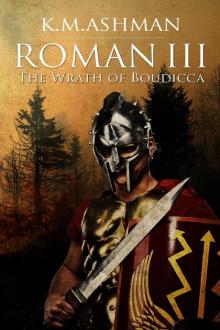 The Wrath of Boudicca
The Wrath of Boudicca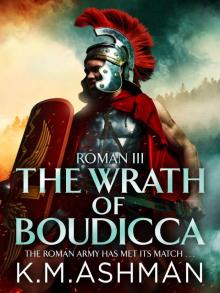 The Rise of Caratacus
The Rise of Caratacus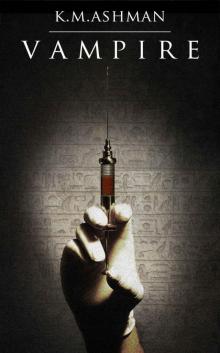 Vampire
Vampire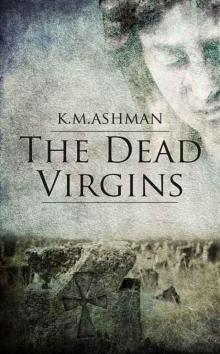 The Dead Virgins (The India Sommers Mysteries Book 1)
The Dead Virgins (The India Sommers Mysteries Book 1)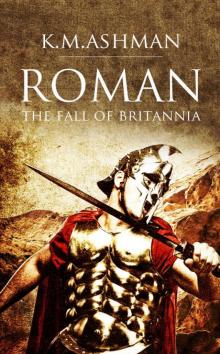 Roman - The Fall of Britannia
Roman - The Fall of Britannia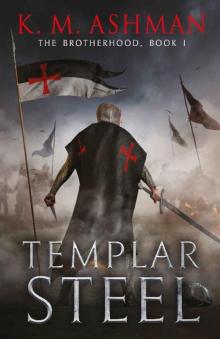 Templar Steel
Templar Steel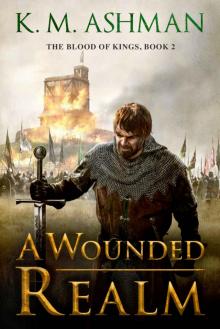 A Wounded Realm
A Wounded Realm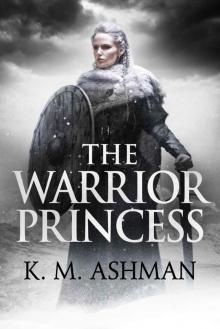 The Warrior Princess
The Warrior Princess